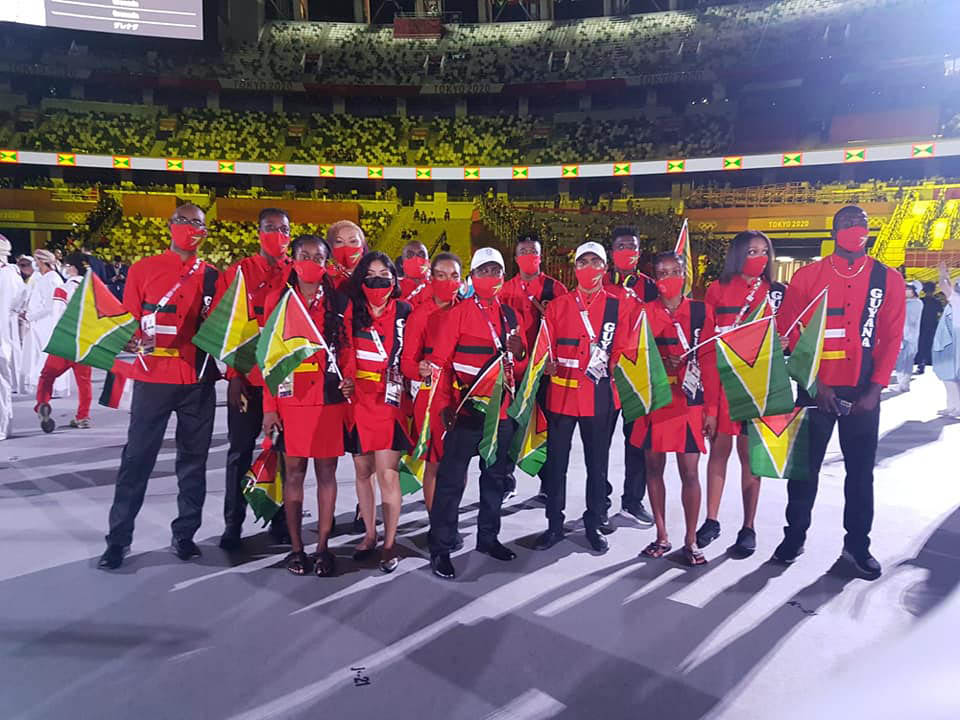 Paris 2024 will be Guyana’s 18th participation at the Olympic Games, where the quest to break the long drought of non-success at the world’s premier sports event will continue.
Paris 2024 will be Guyana’s 18th participation at the Olympic Games, where the quest to break the long drought of non-success at the world’s premier sports event will continue.
Again, it will be another uphill task for an expected contingent of track athletes, possibly boxers, table tennis players and swimmers.
And none of the potential Olympians this year would’ve been born when boxer Michael Parris took the podium for his bronze medal effort back in 1980. From then to now it has been an everlasting wait for more success as underwhelming appreciation by all stakeholders for disciplines outside of cricket, has dimmed all hopes.
Our best chance to notch a place on the Olympics map was back at the 1976 Montreal Games when a strong contingent including world class track athletes, boxers and cyclists, was curtailed by an unexpected last-minute boycott.
The decision epitomized the lack of seriousness by society for such minority sports, then when the country was primed to shine brightest at the global extravaganza.
Prior, our cricketers were the flag-bearers of excellence at the highest levels, confined though to conquests only in Commonwealth countries.
But Montreal presented the avenue for Guyana to extend its presence on the world stage as a tiny, but capable nation.
However, in standing in solidarity with the African nations protesting the presence of New Zealand at the ’76 Games following a tour by the country’s rugby team of apartheid South Africa, Guyana sacrificed a golden opportunity to make an even bigger impact in the quest to kill apartheid.
If you ask sprinter James Wren Gilkes, favored for two medals including gold then, he would unhesitatingly label it the biggest disappointment of his life.
The callousness of the decision was exemplified by its timing, after the team had already travelled to the Games village and hyped to compete. According to the New York Times, uncertainty was rife within its leadership ranks who eventually had to rely on instructions to leave from home via Shirley Field-Ridley, Minister of Sport.
The LFS Burnham- led Government’s attitude was summed up by Chef de Mission Sir Lionel Luckhoo’s parting statement, belatedly stating that principle was more important than gold.
However, his counterparts from Jamaica and Cuba, two of Guyana’s major allies in the Region and staunch supporters of the South Africa apartheid fight as well, couldn’t have dared utter similar mandates as the two countries, ignored this country’s stand, put the athletes’ interest first and rallied for gold.
Don Quarrie, Jamaica’s premier sprinter then, used the Montreal platform to forge his name in Olympics history by speeding to gold in 200 meters, which his rival Gilkes was tipped to win. Trinidad and Tobago was also there and made its presence felt when Hasely Crawford pipped Quarrie for the 100m title, in what could’ve been a Caribbean sweep of medals as the Guyanese was also favored for a podium finish, in the short sprint.
Incidentally, one year prior Quarrie was upset by local star Clifton Schultz at the GCC ground in the Mini Olympics 100m, the latter being part of a strong Guyana relay team Gilkes felt could’ve notched one of seven medals overall, he perceived for the country.
And if Cuba had stayed away, the athletics world might’ve missed out on the unprecedented 400m and 800m double golden runs by legendary Alberto “The Horse” Juantorena, a feat unmatched until today.
Apart from the Gilkes-led athletics lineup, the strong tradition in local boxing was present in the contingent as optimism was high for the likes Robert “Ponehead” Nixon, Mark Harris, Brian Muller, Cleveland Denny Reginal Forde and Michael Reid, to land medals Nixon was shoo-in for at least bronze in the sparsely contested heavyweight division. At the time the local pugilists were hardened by regular battles with the world beating Cubans at the Cardin Games under Cuban expert trainer Trotman Daley.
Not to be outdone, Guyana’s cyclists were swiftly climbing the world rankings ladder through the exploits of sprinter Neville Hunte and road racer Eon D’Ornellas. Both were also in line for medals, but like Gilkes, the boycott was like daggers to their careers which when downhill afterwards.
Ever since, a curse seemingly has shrouded the country as its inability to assemble an Olympics team with as much promise as the 1976 unit, has become legendary.
As the Guyana’s economy spiraled downhill and interest dwindled, the lack of facilities and overall support for our competitors, rendered the country mere participants rather than medal hopefuls, thereafter. Parris’ sterling performance in reaching the 1980 bantamweight semi-finals to clinch the country’s lone bronze, must be noted in the context of the powerful Americans being missing due to a still much maligned boycott by the Jimmy Carter administration.
These days success stories are more difficult for small nations, if you’re not Jamaica, given the introduction of stringent qualifying standards and increasing numbers of participants.
So, Guyana’s presence in 2024, is expected to mirror its composition in Tokyo, three years ago with likely athletes, boxers, swimmers and a table tennis player or two, carrying the Golden Arrowhead.
The contingent size though is dependent on qualifying standards being met, with track and field stars Emanuel Archibald, the Abrams sisters Jasmine and Aliyah along with javelin specialist Leslain Baird in contention.
If they all qualify it shouldn’t be surprising given their encouraging medal winning performances at the Pan American Games late last year in Chile. Otherwise at least one will make the trip on the wild card allocations countries are entitled, likewise the swimmers.
Our boxers an even face more daunting prospect as the likes of Keevin Allicock and Desmond Amsterdam will have to get past tough South American foes en-route to Paris.
It is also a difficult road ahead for the table tennis players as Chelsea Edghill and Shemar Britton among others will be hard pressed to make the final cut.
As it is another small contingent will represent the “Land Of Many Waters” in Paris and unless the belief and confidence in our non-cricketing sportspeople are intensified by all stakeholders, Guyana will not confidently await Olympics glory like our counterparts in Jamaica, Trinidad and Tobago, Grenada and St Lucia will do this year.





